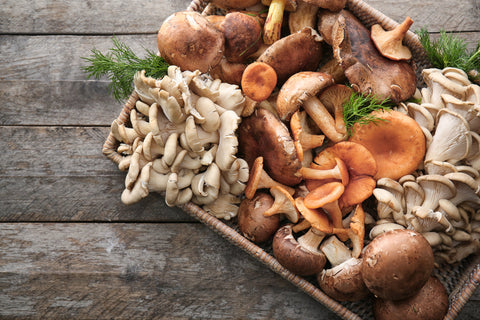Functional mushrooms are cropping up everywhere—from coffee blends to wellness capsules and smoothie powders. But with so many types and so many big claims about boosting focus, immunity, endurance, skin health, and more, it’s hard to know where to start. In today’s roundup, The Top 9 Functional Mushrooms: Power-Packed Species That May Support Your Brain, Body, and Beyond, we’ll cut through the hype and explore what science says about the most researched mushroom species.
We’ll begin with a quick summary of each mushroom's stellar qualities. Then, we’ll dive deeper into the evidence behind these claims and wrap up with practical strategies for choosing the right fungi for your own health goals. Let’s unlock the mysterious magic of mushrooms—one fantastic fungus at a time!
Quick TL;DR: The Superstars of Functional Mushrooms
- Lion’s Mane: Brain clarity, learning, stress support
- Chaga: Antioxidant powerhouse, immune support
- Cordyceps: Endurance, energy, anti-fatigue
- Reishi: Calm, sleep, immune modulation
- Turkey Tail: Immune balance (β-glucans), cancer therapy support
- Maitake: Blood sugar and metabolism
- Shiitake: Everyday immunity, cholesterol control
- Agaricus Blazei: Anti-inflammatory, liver & metabolic benefits
- Tremella (Snow Fungus): Skin hydration, antioxidant effects
Why Mushrooms Are an Essential Part of Modern Wellness
Mushrooms have long been revered in cultures worldwide, from traditional Asian medicine to European cuisine. Today, evidence is building for just how powerful—including life-changing—they can be when it comes to supporting health in multiple ways:
- Cancer Risk Reduction: Eating about 1–2 cups of mushrooms per week may lower certain cancer risks by up to 45%. Mushrooms like shiitake, oyster, and maitake are especially rich in antioxidants like glutathione and ergothioneine. These help protect cells from damage and keep our immune system in fighting shape [1][4].
- Support for Brain Health: Mushrooms contain B vitamins and antioxidants that support neurotransmitters in our brains. Clinical studies found that just two cups of mushrooms weekly is tied to a significant drop in the risk of mild cognitive impairment, sometimes a forerunner of diseases like Alzheimer’s. Lion’s mane and cordyceps might offer even more neuroprotective effects, according to emerging research [1][4]. For a deep look at why Lion's Mane is earning such “brain-boosting” buzz, see The Health Benefits of Lion's Mane.
- Heart Health: Shiitake mushrooms hold specific compounds that can lower cholesterol. Replacing some red meat with mushrooms is another way to eat less saturated fat while still enjoying delicious, hearty meals [4]. Curious about shiitake’s role in everyday heart wellness? Check out The Health Benefits of Shitake Mushrooms.
- Immune System Boost: Mushrooms shine thanks to their inflammation-fighting and antioxidant powers, with selenium, vitamin D, and vitamin B6 as key players. Types like turkey tail and reishi are especially noted for their immune benefits, though there’s more to discover through future studies [3][5][2]. Want to know more about these immune heroes? Read The Health Benefits of Turkey Tail Mushrooms and The Health Benefits of Reishi.
- Blood Pressure Control: Their high potassium content helps counter sodium and relax blood vessels, an advantage for naturally lowering blood pressure [3][5].
- Vitamin D Source: Certain mushrooms, like white button, cremini, and portabellas, pump up their vitamin D content when exposed to sunlight or UV lamps. This matters for immune strength and strong bones—some mushrooms offer more D than an egg per serving [3][4]. Dive deeper into the wellness perks of this popular supermarket variety at The Health Benefits of White Button Mushrooms.
- Weight Management: Mushrooms are high in fiber, low in fat and calories, so they keep you fuller for longer—ideal for those watching their waistline [3][5].
- Lower Sodium Intake: Swap mushrooms in for salty processed foods or red meats to nudge sodium levels down and support heart health [4].
Mushrooms are also packed with fiber, protein, potassium, selenium, zinc, and a spectrum of B vitamins [1][3][4][5]. In short: these fungi do far more than spice up a pizza—they deliver supercharged nutrition straight to your cells!
Meet the 9 Most Researched Functional Mushrooms (and Their Science-Backed Perks)
Let’s zoom in on the heavy hitters, from the “nootropic mushroom” to beauty elixirs and metabolic masters.
1. Lion’s Mane (Hericium erinaceus)
- Why it stands out: The go-to for brainpower and nerve support.
- Active Compounds: Hericenones and erinacines, which help spark Nerve Growth Factor (NGF) production in the brain and nervous system.
- What the research says: In a 16-week clinical trial with older adults, supplementing with Lion’s Mane led to faster memory recall and mental processing. Some early findings point to benefits for lowering subjective stress in younger people. However, claims about mood, anxiety, and focus need more robust evidence before they become consensus [2].
- Fun Fact: Lion’s Mane has a mild seafood-like flavor—great in teas, coffees, or sprinkle blends.
- For more in-depth info, see The Health Benefits of Lion's Mane.
2. Chaga (Inonotus obliquus)
- Why it stands out: The “King of Antioxidants,” with a hard, dark conk loaded with polyphenols and betulinic acid.
- Key actions: Potent antioxidant effects, immune system balance, and synergy with other wellness boosters like microalgae extracts.
- Research finds: Both animal and small-scale human studies highlight Chaga’s ability to raise antioxidant levels and regulate T-cell function. Recent laboratory work shows that combining Chaga with other natural extracts could even boost anti-cancer activity—though more human trials are needed [1].
- Flavor: Earthy, often brewed as a coffee alternative.
- Curious about Chaga’s origin story? Read The Health Benefits of Chaga.
3. Cordyceps (C. militaris / C. sinensis)
- Why it stands out: “Energy mushroom” for athletes and tired minds.
- Key nutrients: Cordycepin and adenosine analogues help boost cellular ATP—the energy currency.
- Benefits shown: Human and animal experiments found that Cordyceps can raise VO₂ max (the body’s oxygen use), help clear lactic acid faster, and fight fatigue. Handy for that mid-afternoon dip or serious exercise [1].
- Taste and use: Naturally savory, Cordyceps brightens up coffees and teas.
- For the science, see The Health Benefits of Cordyceps and find more performance-boosting details in Cordyceps Benefits: Unveiling the Power of This Incredible Fungus.
4. Reishi (Ganoderma lucidum)
- Why it stands out: The “mushroom of immortality” used for centuries to calm the body and mind.
- Star players: Triterpenes and powerful polysaccharides for relaxation, immune support, and liver protection.
- Science update: In a placebo-controlled study, participants taking a Reishi concentrate reported less fatigue and lower anxiety after eight weeks. But remember, claims about Reishi’s complete effects on anxiety and sleep are still under review [2].
- Hot tip: Slightly bitter, Reishi works well when blended with cacao or herbal teas.
- Discover more about its adaptogenic benefits in The Health Benefits of Reishi.
5. Turkey Tail (Trametes versicolor)
- Why it stands out: Super immune ally with bright, wavy “rings.”
- Winning ingredients: β-glucans—especially PSK and PSP—studied for their immune-boosting and cancer-adjunct benefits.
- What studies show: Randomized trials link Turkey Tail extracts with supercharged natural-killer cell function and improved outcomes in cancer therapy. It’s subtly flavored (almost neutral), making it an easy add-in [2].
- Everyday uses: Mix into shakes, teas, or broths.
- Learn more at The Health Benefits of Turkey Tail Mushrooms.
6. Maitake (Grifola frondosa)
- Why it stands out: Best for metabolism and blood sugar.
- Star molecules: D-Fraction β-glucans, with a unique ability to improve insulin sensitivity and glucose metabolism.
- Backed by research: In both mouse and early human models, Maitake lowered fasting insulin and blood sugar. Additional perks may include balancing blood pressure and supporting a strong immune system [1][3].
- Chef tip: Maitake ("Hen of the Woods") is earthy and rich, delicious roasted or sautéed.
- See more at The Health Benefits of Maitake Mushrooms.
7. Shiitake (Lentinula edodes)
- Why it stands out: The immune-boosting, cholesterol-friendly mushroom most of us know from soup and stir-fry.
- Magic inside: Lentinan (an immunomodulator), plus vitamin D (especially if UV-treated), and eritadenine to manage cholesterol.
- Clinical snapshot: Daily intake of dried Shiitake in adults boosted critical immune marker sIgA after just four weeks. It may also help lower cholesterol for heart health [4].
- Kitchen wisdom: Savory and meaty—an easy addition to almost any meal for maximum health bang.
- Dive into the details in The Health Benefits of Shitake Mushrooms and explore worldwide culinary uses with Exploring the World of Shiitake Mushrooms.
8. Agaricus Blazei (Almond Mushroom/ABM)
- Why it stands out: A gentle, sweet-tasting mushroom with anti-inflammatory and anti-tumor abilities tested in lab models.
- Active effects: Shown in reviews to help support the liver, ease inflammation, improve metabolic markers, and foster healthy gut bacteria.
- Taste: Slightly nutty and mild. Great for hot beverages or morning coffee blends.
9. Tremella fuciformis (Snow Fungus)
- Why it stands out: “The beauty fungus”—prized for hydrating skin and supporting a youthful glow.
- Science spotlight: Its unique polysaccharides act like nature’s hyaluronic acid, locking in moisture. In a controlled study, topical Tremella gel boosted skin hydration more than a placebo, lasting hours post-application. As an oral antioxidant, it may aid collagen formation too [3].
- Sensory note: Nearly flavorless and adds a lovely creamy mouthfeel to drinks.
How to Choose and Enjoy Functional Mushrooms
Every mushroom brings its own strengths to the table:
- Cognitively: Lion’s Mane for focus, Chaga and Tremella for antioxidant defense,
- For Endurance: Cordyceps is a natural pick.
- For Calm and Balance: Reishi tops the list.
- For Immune and Metabolic Health: Consider Turkey Tail, Maitake, Shiitake, or Agaricus Blazei.
You’ll get the most benefits by blending two or three different types—each at reasonable dosages—for a synergistic effect without overwhelming flavors. Whether you sip them as coffee or matcha, stir them into smoothie bowls, or pop a capsule, functional mushrooms are flexible, accessible, and flavorful.
Pro Tip: Want a balanced blend that brings together some top-tier mushrooms? Try our Mushroom Kick coffee—a tasty way to start your morning with five potent mushrooms. Start simple, taste the difference, and see how you feel! For answers to all your mushroom coffee newbie questions, check out Mushroom Coffee FAQs for First-Timers. Curious about the unique “kick” of mushroom coffee compared to the classic cup? Find out in Mushroom Coffee vs Regular Coffee: Why the "Kick" Feels Different.
Cautions and Clinical Realism
A final note: While these mushrooms deliver many proven nutrients and antioxidants, some wellness claims—especially for mood, anxiety, and extreme cognitive boosts—are still being studied [2]. It’s wise to enjoy mushrooms as part of a balanced diet packed with other fruits, veggies, and healthy proteins [1]. Wondering how the different supplement forms stack up? Read Exploring Mushroom Supplements: Which is Best for You?.
Always talk with your doctor before beginning new supplements, especially if you’re on medication, have allergies, or are managing chronic conditions.
The Takeaway: Fungi for Your Future
Mushrooms, whether exotic or familiar, provide fiber, protein, antioxidants, and unique compounds that can support your mind, immunity, heart, skin, and energy. Easy to sneak into any meal or drink, their health-protecting powers are finally being validated by modern science [1][3][4][5].
Excited to experiment? Today’s functional fungi could be the extra boost your wellness routine has been missing. Blended together or celebrated on their own, these top 9 mushrooms show just how thrilling—and delicious—taking care of your health can be.
References
[1] https://www.cedars-sinai.org/
[2] https://www.consumerreports.
[3] https://www.webmd.com/diet/
[4] https://www.uclahealth.org/
[5] https://health.


